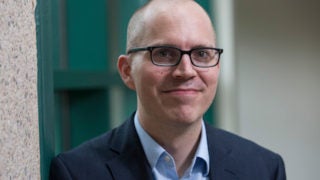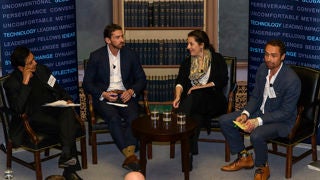Georgetown’s Department of Computer Science and Kennedy Institute of Ethics’ (KIE) Ethics Lab will infuse ethics into its computer science curriculum, creating what experts say could become a national model.
The project, funded by a Mozilla Responsible Computer Science Challenge grant, is part of the university’s Initiative on Tech & Society, which is training the next generation to understand technology’s complex impact on society and develop innovative solutions at the intersection of ethics, policy and governance.
The new project will pair computer science faculty with the philosophers and designers of Ethics Lab to design and run customized workshops inside three computer science courses.
Ethical Mindset
“Tomorrow’s leaders must be able to analyze the ethical dimensions of a range of issues, if they want to help shape our culture, institutions and policies,” explains Maggie Little, a professor of philosophy and KIE senior scholar who directs Ethics Lab. “The aim of this project is to prepare students for the real-world scenarios they’ll inevitably face in the workforce.”
Beginning this fall, computer science students can enroll in courses featuring ethics-focused activities, workshops, and projects co-designed and delivered by computer science faculty and the Ethics Lab team.
The courses, Advanced Programming, Introduction to Algorithms and Introduction to Artificial Intelligence, will allow students to engage directly with real-world ethical impact.
“We want students to go out into the world and have an impact not just in computer science, but in psychology, or physics, or ethics or policy, ” says Nitin Vaidya, chair of Georgetown’s Department of Computer Science. “We want our curriculum to span that boundary.”
Also working on the project to infuse ethics into three computer science courses are Ray Essick, assistant teaching professor, computer science department; Mark Maloof, professor, computer science department; Elizabeth Edenberg, senior ethicist, Ethics Lab; and Jonathan Healy, assistant professor of the practice and assistant director of Ethics Lab.
Little hopes participating faculty members will then be empowered to deliver the ethics components in their courses on their own so students can use a framework embedded in values to propose concrete change around some of the most pressing issues of our time.
A National Model
The ideas fueling the Mozilla grant were developed in Ethics Lab’s Engaging Ethics program, launched in 2017 and supported by a gift from Chandler and Paul (C’62) Tagliabue.
The program partners with faculty across disciplines to infuse creative exercises and workshops across the curriculum, preparing students to be ethical leaders in their fields.
Over the past two years, the program has reached about 350 students across 25 classes, from chemistry to international relations.
As part of the grant, Georgetown will join a select group of colleges and universities, including Harvard, Columbia, and the Georgia Institute of Technology, to form a working group to develop models for integrating ethics into computer science curriculum.
“Drs. Vaidya and Little are important leaders in our nation-wide and global interest in bringing attention to the ethical, legal and value dimensions of the digital revolution,” says Georgetown Provost Robert Groves. “We believe this collaboration, supported by Mozilla, will ensure that students understand the relationship of ethics and problem-solving in the digital world.”




